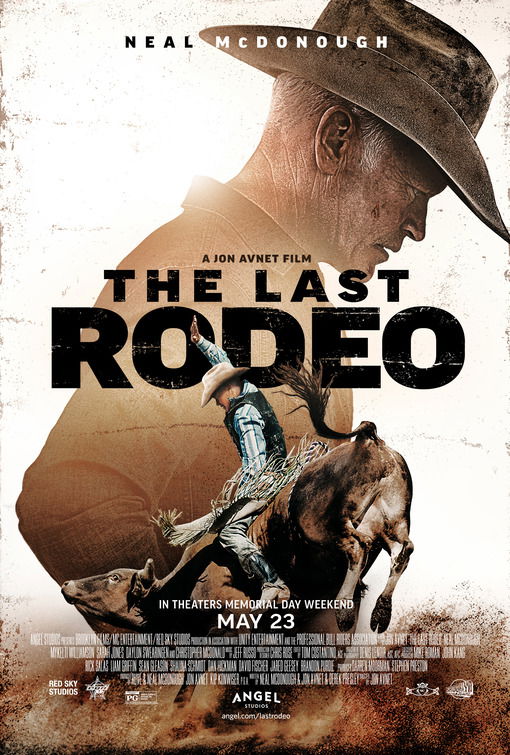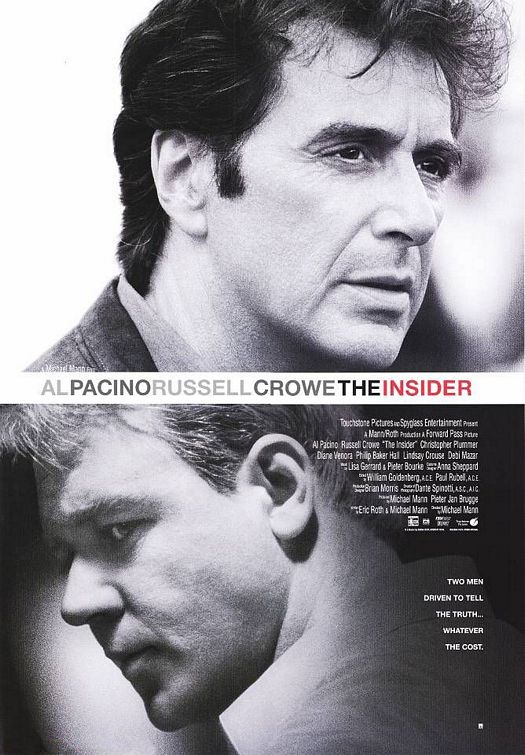“Getting the Inside Dope”

| None | Light | Moderate | Heavy | |
|---|---|---|---|---|
| Language | ||||
| Violence | ||||
| Sex | ||||
| Nudity |
What You Need To Know:
THE INSIDER is a well produced, acted, directed, and photographed movie about a 60 MINUTES producer who helps a scientist blow the whistle on some nefarious activities in the large tobacco companies. Harassed by the scientist’s former company, a large tobacco firm, both the producer and the scientist fight to expose the truth behind the chemical makeup in tobacco products. The scientist becomes a key figure in the federal and state government lawsuits against “Big Tobacco,” but CBS lawyers briefly put the kibosh on a scheduled interview with the intense scientist. This leads to interesting questions about journalistic ethics and corporate machinations.
Playing like an edge-of-your-seat political thriller, THE INSIDER nevertheless has a mild socialistic, humanist worldview with politically correct elements and a tone of historical revisionism, despite its positive moral qualities. For instance, it fails to reveal the Marxist past of the 60 MINUTES producer’s college training. It also fails to consider the dangers of letting Big Brother government harass legal businesses in order to extort money from them, money that will be used to pay for huge social programs. Such social programs seem to be just as addictive as the nicotine in any cigarette
Content:
(So, H, PC, RH, B, LLL, A, D, M) Mild socialist humanist worldview of leftist journalist manipulating humanist scientist into becoming a whistleblower on large, controversial smoking companies, plus some political correctness, historical revisionism & moral elements regarding truth, product liability & ethical issues about TV journalism & business practices; 62 mostly strong obscenities including many “f” words, 1 strong profanity (GD) & at least 1 mild profanity (for God’s sake); no violence, but implied & depicted threats of violence; no sex; no nudity; alcohol use; smoking; and, wife fails to support husband who takes a principled stand against corruption & deceit.
More Detail:
THE INSIDER is reminiscent of last year’s MOVIEGUIDE ® Award winner, A CIVIL ACTION, and is just as well produced as that movie. It is a more controversial work, however, because it involves some disturbing facts regarding one of the premier TV news organizations in the country, CBS-TV’s extremely popular and long-running 60 MINUTES program. The movie alleges that CBS corporate leaders and news executives delayed airing an important interview with a former tobacco company scientist. Of course, the journalists at 60 MINUTES are not too happy with the movie, which has itself become a controversial item in the news. Neither are the tobacco companies.
THE INSIDER, co-written and directed by Michael Mann of HEAT and TV’s MIAMI VICE, is based on a 20-page article in VANITY FAIR magazine by Marie Brenner (May 1996). In her article, she tells how a scientist named Jeffrey Wigand became a key witness in the federal government and various state government’s lawsuits against the large tobacco companies. The lawsuits have triggered a huge public health debate regarding the tobacco companies, who have long denied that smoking is addictive. The lawsuits are costing the companies billions of dollars, with big government and trial lawyers expecting to cash in big time.
An important part of Brenner’s article centers on former 60 MINUTES producer Lowell Bergman, played by Al Pacino in the movie. Bergman was able to convince Wigand to let the famous 60 MINUTES anchor Mike Wallace interview him. CBS-TV delayed the airing of the interview, however, when a leading corporate lawyer for CBS decided that the network may be sued by the tobacco company for whom Wigand used to work because it may look as if CBS News and Bergman had manipulated Wigand to violate a stringent confidentiality agreement. According to the article, Don Hewitt, the creator and executive producer of 60 MINUTES, sided with the network’s decision not to air the interview, with Wallace in favor of airing the interview but not willing to totally buck the network’s decision. Bergman, of course, was more upset, since he had spent about 18 months working with Wigand on other anti-tobacco stories plus the final interview.
The movie focuses on this intrigue between Bergman, the CBS-TV staff and Wigand, who is played by Australian actor Russell Crowe of L.A. CONFIDENTIAL and MYSTERY, ALASKA. Like the article by Brenner, THE INSIDER also focuses on Wigand’s activities as corporate whistleblower, including the alleged death threats he received. Both the article and the movie also delve into the efforts by tobacco company investigators to smear Wigand’s reputation by poking into his less-than-squeaky-clean personal life.
THE INSIDER plays like an edge-of-your-seat political thriller. In fact, it opens with an exciting sequence where Bergman sets up a Mike Wallace interview with an alleged Arab terrorist in Lebanon. Helping to maintain the pace of this tense, involving 158-minute drama is some wonderful acting by Pacino, Crowe and Christopher Plummer as Bergman, Wigand and Wallace, respectively. They are simply marvelous in this movie, which is edited and photographed with striking precision by director and co-screenwriter Michael Mann.
Despite its high production quality and entertainment values, THE INSIDER leaves several important issues unexplored.
One of the most disturbing is the fact that Bergman, the 60 MINUTES producer played by Pacino, did his Ph.D.dissertation under the 1960s campus radical and Marxist professor Herbert Marcuse. Bergman, as played by Pacino, says in the novel that Marcuse was his mentor and that he was an editor on the “radical” magazine RAMPARTS, but the movie fails to mention the Marxist roots of both Marcuse and RAMPARTS. This is a terrible moral flaw, a definite problem of integrity, for THE INSIDER, even though the movie does not strongly push a Marxist agenda per se. The question arises, however: What led 60 MINUTES to hire a campus radical like Bergman in the first place? And, what does it say about Mike Wallace’s reporting style that he and Bergman worked closely together for 14 years? (In a recent phone interview, Bergman denied Marcuse was his mentor. He seemed evasive, however, when asked about his ownpolitical views, steering the conversation toward other topics.)
THE INSIDER also seems to mute the more irascible qualities in Wigand’s character. For instance, the original VANITY FAIR article by Marie Brenner describes Wigand as “prickly, isolated and fragile.” The article even quotes Mike Wallace, who calls Wigand “peculiar.” Little of this comes through in the movie, leaving one to wonder seriously if the filmmakers made a concerted effort to tone down Wigand’s peculiarities and personal problems to gain more sympathy for him. The movie also makes Mike Wallace look worse than he actually does in the original article. Perhaps that difference represents Bergman’s perspective, since Bergman is reportedly a friend of director Mann and worked closely with Mann on the movie.
Other issues left unexplored in THE INSIDER by Mann and his cohorts are Bergman’s apparent efforts to help Wigand become a key government witness, the failure of 60 MINUTES to fully explore the whole issue of human responsibility and free will that the very term “addiction” brings up (an issue, by the way, which seems to be the crux of the lawsuits and public health debate over tobacco use), and the controversy over whether governments should even get involved in such public health issues and expenses. After all, tobacco is, the last time anyone checked, a legal substance. In the movie, Pacino as Bergman rationalizes his efforts to help Wigand become a key government witness by saying that the news staff needs to provide some legal protection for Wigand. This may indeed be true, but it is disturbing to know that a supposedly “objective” journalist is working so closely with government bureaucrats who are taking such a strong stance on a controversial issue (tobacco use) involving controversial legal issues. Such behavior displays a possible bias in favor of big socialist government, not only by the filmmakers but also by the staff at 60 MINUTES and CBS News, including Wallace and Bergman. Thus, THE INSIDER neglects to consider the dangers of letting Big Brother government harass legal businesses in order to extort money from them to pay for huge social programs. After all, such social programs seem to be just as addictive as the nicotine in any cigarette.
Perhaps more disturbing than these things, however, is an important fact that the movie fails to tell the audience. In the movie, much is made of the discovery by Wigand that his company has been adding a carcinogen called coumarin to its tobacco. This plays an important part in the interview of Wigand that Mike Wallace conducts and CBS finally airs. What the movie does not tell you, but the VANITY FAIR article does, is that coumarin was an additive being placed in pipe tobacco, not cigarette tobacco! Since few people smoke pipe tobacco, and since people who do smoke pipes do not often demonstrate the kind of nonstop addictive behavior that cigarette smokers do, the issue of the alleged carcinogenic effects of coumarin is not as important an issue as the movie tries to make it out to be. This again makes one wonder what kind of agenda THE INSIDER is trying to push.
All of this demonstrates how unduly manipulative THE INSIDER seems to be. Of course, Michael Mann always has been a director who makes sure his audience is entertained while they’re watching his movies. It is one thing, however, to create an entertaining piece of fiction like HEAT and quite another thing entirely to create a movie based on real historical, legal events with real people and real institutions. In watching a movie based on true events, it is reasonable to expect that the filmmakers will naturally dramatize the events in an entertaining, even thrilling, manner. However, so many of this type of movie from Hollywood seem to contain a left-leaning, atheist perspective that distorts history in order to manipulate public opinion.
Therefore, THE INSIDER deserves an extreme caution for viewers interested in seeing this movie. It contains a mild socialistic, humanist worldview with politically correct elements and a tone of historical revisionism. It also contains, however, some moral elements regarding truth, product liability & issues of journalistic and corporate ethics. Ultimately, the large tobacco companies in America may indeed need to drastically reform their business practices. That does not mean, however, that large government bureaucrats, self-righteous TV news organizations and filmmakers should overly demonize these companies. Scientific evidence does in fact show that smoking is dangerous to your health. The answer to such dangers is not to take that first puff in the first place. Failing that, people should smoke only in moderation. If reducing the level of nicotine in tobacco products encourages such good health habits, then people should work on their own to make this happen. But, let’s keep Big Brother’s filthy, money-grubbing, crypto-fascist hands out of it!


 - Content:
- Content: 



